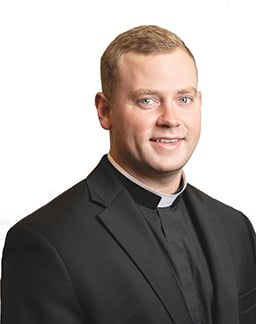The three steps: the Way, the Truth, and the Life

“Thomas said to Him, ‘Master, we do not know where you are going; how can we know the way?’ Jesus said to him, “I am the way and the truth and the life. No one comes to the Father except through me’” (John 14:5-6).
Many of us relate to Thomas. “Lord, where are you? We do not see you. How do we know the way to follow you? Where do we go?”
Jesus’ response to us is the same that it was for Thomas. “I am the way, the truth, and the life.”
Jesus’ message to His followers does not include a map, nor a simple list of truths, nor a one-size-fits-all guide to life. His message is simple not because it lacks depth, significance, and challenge. His message is simple because ultimately it is a Person. His message is Himself, the Savior of the world, the Lover of our souls, our one and only Hope, our only Way, our one Truth, our Life.
To follow Jesus means to follow Him as a disciple: the way. It means to seek to know Him, to learn about Him, to find Him, and eternally relate to Him more deeply: the truth. It means to live our lives in the way He showed us by giving ourselves away completely to others. To give is to die, and to die is to live: the life.
If Jesus’ place in our lives does not include all three of these, something is missing. If we do our best to avoid sin, attend Mass, and avail ourselves of the sacraments, our life speaks of being a good Catholic and a good disciple. But do we know Him? Do we give ourselves away as He did? If we spend much time in prayer, in learning about Church teaching and the spiritual life, and studying the Church’s theology, we are doing well to seek Christ as the Truth. But does this truth take root and transform us into people who actively seek ways to serve? Especially those whom we most do not want to serve? Do we allow ourselves to carry the cross of other people? Or do we run away and distract ourselves?

As vocation director, my task is to follow Christ as the way, truth, and life. In the Gospels of Luke and Matthew, we hear the Lord say, “The harvest is abundant, but the laborers are few. Therefore ask the master of the harest to send out laborers into his harvest.” This means praying to God for more vocations, but it also means praying that we become better laborers. It means facing the difficult question: Do I actually labor in the Lords’ harvest? Do I encourage young men to become priests, the shepherds of our harvest? Do I really believe that the Lord is willing to work with and through me if I make Him — in my life — the way, the truth, and the life?
Our diocese has 26 seminarians studying for the priesthood. This is an incredible blessing. These men have pursued the Lord as disciples. They have learned about Him and His harvest, and what it means to be His laborers. They have said yes to pick up the cross and serve in a way that is public, profound, difficult, and truly will save souls.
Our response to these men should be gratitude and prayer, of course. But even more so, it should be inspiration. If a healthy young man who has grown up in today’s culture, which tells him everything the opposite of the priesthood will make him happy and still chooses to make Christ his way, his truth, and his life, this means that the Gospel is real, it is true, and that Jesus Christ has not given up on His Church. Let this give us hope, and let us forever seek to become greater laborers for His harvest.
